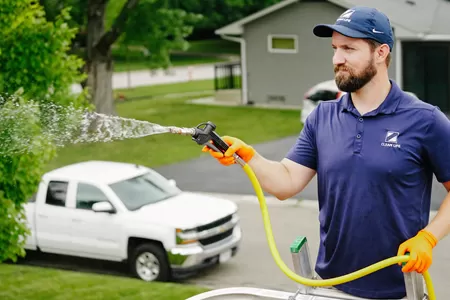Soft Washing: Gentle and Effective Cleansing for Delicate Surfaces
Soft Washing: Gentle and Effective Cleansing for Delicate Surfaces
Blog Article
Opening the Power of Stress Laundering: A Comprehensive Take A Look At Effective Exterior Cleansing Solutions for Decks, Fences, and Sidewalks
Pressure cleaning stands out as a vital tool in exterior maintenance, effectively renewing decks, fencings, and pathways by getting rid of built-up dirt, mold and mildew, and grime. As we check out the details of pressure washing, it becomes noticeable that the best approach can make a considerable distinction-- yet numerous house owners neglect important aspects that can boost their cleansing efforts.
Advantages of Stress Washing
Pressure washing efficiently renews surfaces, making it a necessary upkeep practice for both domestic and commercial residential or commercial properties. By getting rid of dust, mold and mildew, mildew, and gunk, pressure cleaning restores the initial appearance of surfaces, contributing to a more welcoming environment.
Additionally, pressure washing expands the lifespan of surface areas. Routine cleansing can avoid the accumulation of unsafe materials that lead to degeneration, saving property owners significant expenses out of commission or substitutes. Pressure washing advertises health and safety and security by eliminating slippery materials, such as algae or moss, which can present hazards.
One more benefit is the efficiency of the process. Pressure washing can cover big locations in a fraction of the moment it would take making use of traditional cleaning techniques. This efficiency is especially advantageous for industrial buildings that need minimal interruption to operations.
Planning For Pressure Washing
Before participating in stress washing, mindful prep work is essential to ensure optimum results and protect bordering areas. Begin by evaluating the location to be cleaned, eliminating any kind of obstacles such as furnishings, planters, or ornamental items. This creates a clear work space and decreases the threat of damages throughout the cleaning process.
Next, examine the surface areas for any kind of loose paint, mold and mildew, or debris. Attending to these issues in advance can boost the performance of the stress washing. For circumstances, removing loose paint can avoid it from being pushed into the surface during washing.
Additionally, it is important to secure nearby plants, home windows, and delicate surfaces. Take into consideration covering plants with tarps or plastic bed linen and using painter's tape to protect windows from water damage (Roof Cleaning). Ensure that the stress washer is outfitted with the proper nozzle and stress settings for the certain surfaces to prevent causing harm
Last but not least, prepare the pressure washing machine by examining fluid degrees and guaranteeing all links are safe. This preparation prepares for an effective stress washing session, generating a tidy and revitalized outside.
Methods for Various Surface Areas
Achieving ideal cleanliness requires a customized approach to different surfaces during stress washing. Each product, whether timber, concrete, or vinyl, requires specific methods to ensure reliable cleansing without creating damages.
For wood decks, making use of a low-pressure setup is vital. This technique protects against splintering and maintains the timber's stability. Using a cleaning remedy designed for timber can boost the removal of gunk and mold, guaranteeing an extensive tidy.
Concrete surfaces, on the other hand, can withstand greater stress levels. A fan nozzle is advised for large areas, while a slim nozzle can target difficult spots effectively. Pre-treating stains with a degreaser can yield improved results, particularly for oil or oil marks.
Vinyl fences require a gentler touch, similar to timber. A medium-pressure setup integrated with a soft-bristle brush attachment can effectively remove dust without scratching the surface. It is crucial to utilize a cleansing remedy specifically formulated for vinyl to prevent staining.
Choosing the Right Equipment
Picking the suitable tools is essential for successful pressure cleaning, as it directly affects effectiveness and cleaning results. The first factor to consider is the pressure washer itself, which is available in different kinds: electrical, gas, and diesel. Electric designs are suitable for light-duty tasks such as cleaning decks and fences, while gas-powered devices supply more greater pressure and are suited for harder jobs like eliminating crud from walkways.
Following, think about the stress rating determined in PSI (pounds per square inch) For fragile surface areas, a lower PSI (1,500 - 2,000) suffices, while extra robust materials might need ratings of 3,000 PSI or more. Additionally, the circulation price, measured in GPM (gallons per min), is critical; higher GPM means quicker cleaning.
Nozzles play a significant function in attaining desired outcomes, with various shades indicating differing spray angles and pressures. By very carefully choosing equipment tailored to certain cleansing tasks, you can make best use of efficiency and accomplish optimum outcomes in your stress cleaning ventures.

Maintenance Tips After Cleansing
Proper upkeep after stress cleaning is crucial for prolonging the lifespan of both the cleansed surfaces and the tools utilized. After finishing your pressure cleaning task, allow the surface areas to dry entirely to stop moisture retention, which can result in mold and mildew and mildew development. For wooden surfaces like decks and fencings, use a top quality sealer or discolor to improve protection versus the components. This not just protects the aesthetic charm but also strengthens the wood versus rotting and contorting.
Setting up routine cleanings based on environmental direct exposure can assist keep their appearance and honesty. For equipment upkeep, ensure that you thoroughly clean up the pressure washing machine after use, removing any kind of debris from the nozzle and pipes.
Shop your stress washing tools in a completely dry, protected location to avoid corrosion and damage. Soft Washing. Adhering to these upkeep tips will not only keep your outdoor spaces looking pristine yet also make best use of the performance and lifespan of your pressure cleaning equipment
Conclusion

Report this page